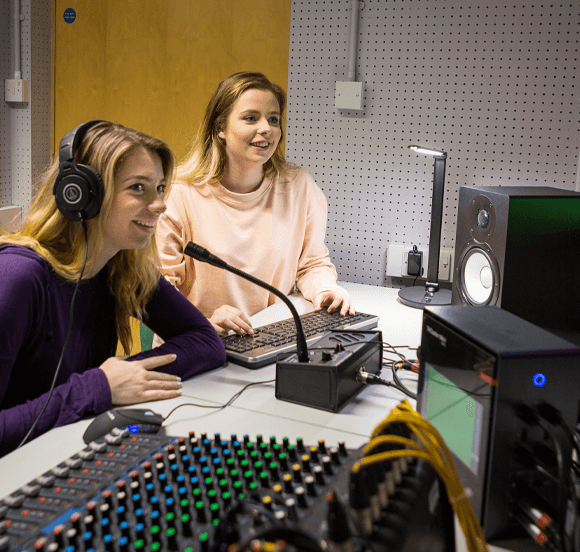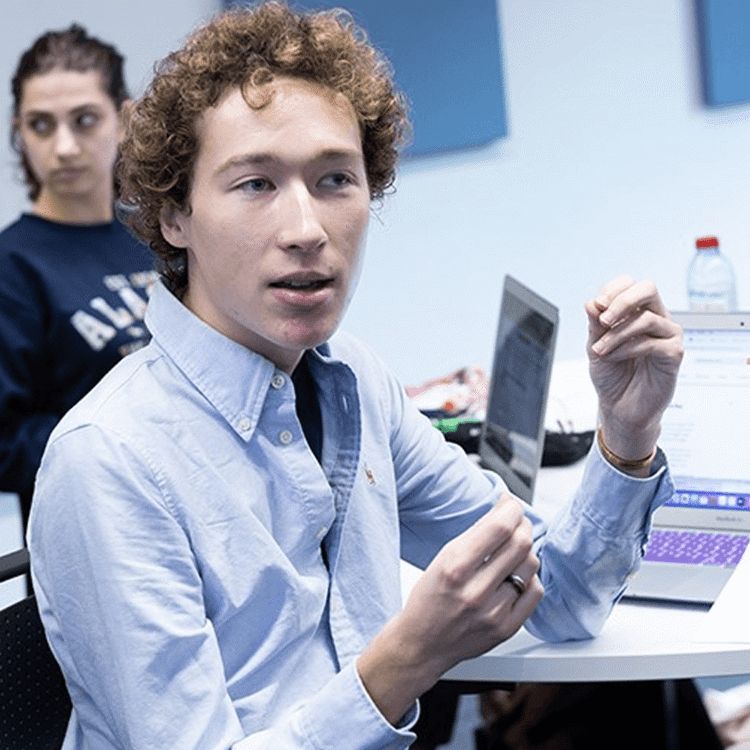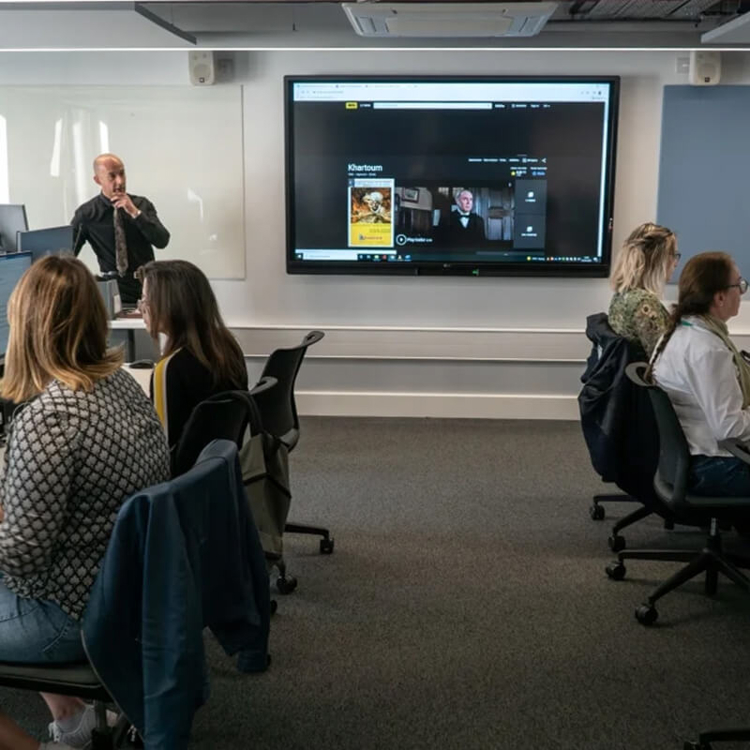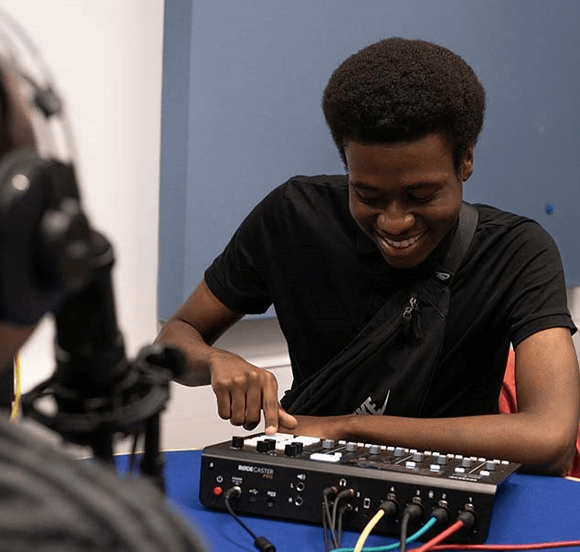/ Postgraduate Taught /
Start date:
September 2025
Duration:
1 years (full-time)
2 years (part-time)
Please add an additional year if undertaking the Professional Experience Year: integrated 2-year masters
Number of credits:
MA: 180
PGDip: 120
PGCert: 60

Postgraduate, Master's and Doctoral On Campus Open Day
Saturday 10 May 2025
An experience like no other. Understand how media and communications shapes our social, cultural and political discourse. You'll learn how you can make a material impact on the world through effective strategic communication.
Did you know?
This Media and Communication Programme is accredited by The Chartered Institute of Marketing (CIM). The accreditation provides students with the opportunity to be part of a worldwide community of members and the opportunity to enhance their employability by taking CIM globally recognised professional qualifications in their initial steps towards Chartered Status.

Modules
Professional Experience Year
This course also offers the option of a Professional Experience Year. This programme combines dynamic career modules with flexible placement opportunities. After completing your first year of study, you'll then complete a full year of Professional Experience training as part of your degree. This will give you real career experience. This unique opportunity offers you distinct paths to build your expertise.

Skills
Skills to get you ready for an exciting career.
This professionally orientated MA Media and Communications course is aimed at providing you with the practical and theoretical knowledge to understand and work within the media industry both in the UK and internationally.
Throughout this course, you will develop essential digital and professional skills in:
- Audience research
- Audio-visual media content production
- Data analysis for media and communication research
- Designing and executing digital marketing and communications campaigns
You will gain critical skills in qualitative and quantitative research methods which will help you to conduct descriptive statistical analysis of your communications and reflect on the critical and ethical concepts of media through different formats.
Learning
A course built around you.
This course will be conducted through seminars and practical workshops where students will be supported to build their abilities to a professional level.
In the Autumn semester, you will explore the global impact of media systems, learn qualitative audience research methods, and study campaign communication, marketing, and storytelling with a focus on media ethics and engagement. You will also develop creative skills in producing media content across formats, combining research, analysis, and digital production for factual and fictional narratives.
In the Spring semester, you will learn to create effective communication strategies for marketing, focusing on impactful narratives and purpose-driven campaigns. You'll also explore audience engagement through digital platforms, using quantitative and qualitative methods to analyse social media and apply statistical techniques in media research.
Finally, you will complete a Major Project which will apply the knowledge and skills gained throughout the programme to tackle an organisational challenge, managing a project from concept to completion. The final output could include a marketing campaign, multimedia narratives, or academic research, consolidating your learning and project management abilities.
Teaching will be led by subject- specialists with input from practitioners offering guest presentations and workshops.

Assessment
Apply your knowledge in real-world contexts.
The assessments for this course are designed to:
- Reflect professional formats
- Focus on building your personal portfolio
- Prepare you for success in a professional environment after graduation
By the end of your MA, you will have a deep understanding of how various media can drive social and cultural change, positioning you to excel in industries that seek versatile, multi-skilled communication professionals.
Career
The MA programme is tailored to prepare you for professional communications roles, with a focus on the growing demand for graduates skilled in digital communications and media production.
Career routes for graduates include:
- Market and audience-research roles
- Marketing
- Social media and web analytics positions within communications teams
- Social media executive (creating content and coordination)
- Digital media officer
- Media planner (digital and traditional)
Additionally, you will be equipped to thrive in roles that require a blend of analytical, creative, and communication skills.

Open days
Get a real taste of our campus, community and what it’s like to study at Roehampton
Applying
UK postgraduate students apply through our direct application system.
Course subject to curriculum enhancement and revalidation.
General entry requirements
September 2025 entry tuition fees (UK)
| Level of study | Full-time | Part-time* |
| MA | £11,250 Professional Experience Year: £2,500 |
£5,625 |
| PGDip | £7,500 | £3,750 |
| PGCert | £3,750 | £1,875 |
*Year 1 fee
We offer a wide range of scholarships and bursaries. See our financial support pages for UK students.
We also provide other ways to support the cost of living, including free buses and on-campus car parking, hardship support and some of the most affordable student accommodation and catering in London. Find out more about how we can support you.
International postgraduate students apply through our direct application system.
Course subject to curriculum enhancement and revalidation.
General entry requirements
September 2025 entry tuition fees (international)
| Level of study | Full-time | Part-time* |
| MA | £18,250 Professional Experience Year: £2,500 |
£9,125 |
| PGDip | £12,170 | £6,085 |
| PGCert | £6,085 | £3,045 |
*Year 1 fee
We offer a wide range of scholarships and bursaries. See our financial support pages for international students.
We also provide other ways to support the cost of living, including free buses and on-campus car parking, hardship support and some of the most affordable student accommodation and catering in London. Find out more about how we can support you.






